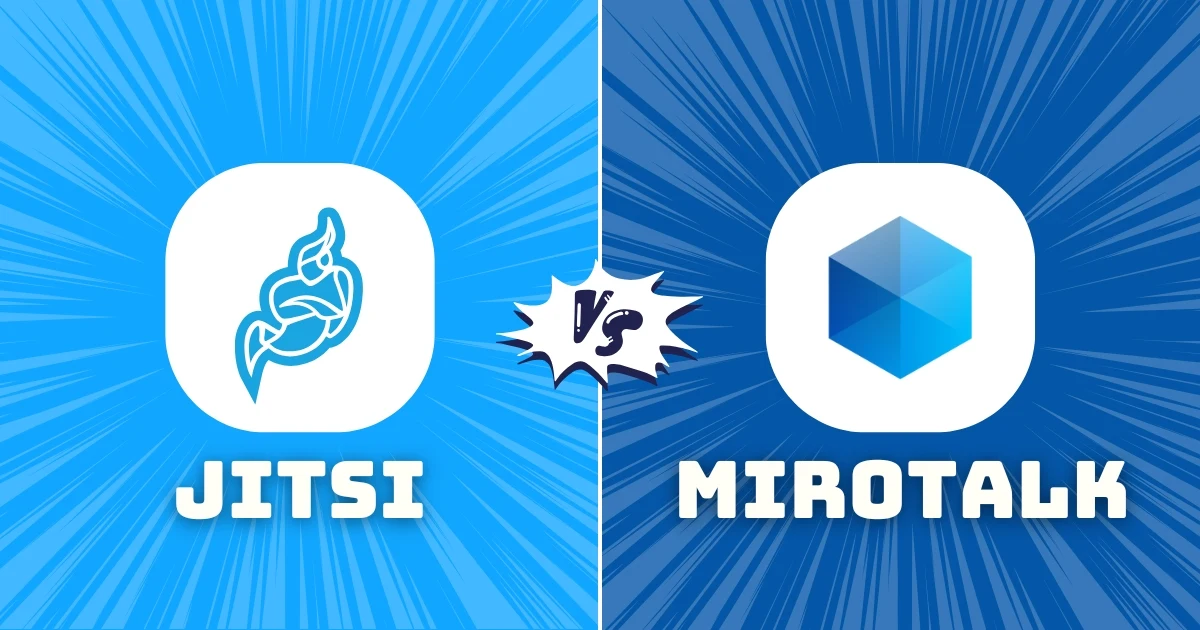Introduction
These days, video calls are a big part of our lives—whether you’re working from home, learning online, or just catching up with friends. There are many apps out there, but Jitsi and MiroTalk stand out because they’re both free, open-source, and made with privacy in mind.
In this guide, I’ll help you understand how these two platforms are different, and which one might be better for you.
What is Jitsi?
Jitsi is a free tool for video meetings. You don’t need an account, and it works right in your browser. It’s simple and secure—perfect for quick, private meetings.
Key Features of Jitsi:
- No Sign-Up Needed – Just open the site and start a meeting.
- End-to-End Encryption – Your calls stay private.
- Screen Sharing – Show your screen to others.
- In-Call Chat – Send messages and emojis.
- Integrates Easily – Works with Google Calendar, Slack, etc.
- Mobile Apps – Available for both Android and iPhone.
If you’re looking for a tool that’s easy to use and doesn’t need setup, Jitsi is a great pick.
What is MiroTalk?
MiroTalk is another free and open-source video calling app. It focuses on clear video quality and is packed with modern features. It comes in two versions:
- MiroTalk P2P – For small one-on-one or small group chats.
- MiroTalk SFU – For bigger group calls with better performance.
Key Features of MiroTalk:
- Browser-Based – No need to download anything.
- Super Sharp Video – Supports up to 8K at 60 FPS.
- Screen + File Sharing – Share your screen and files easily.
- Virtual Backgrounds – Change your background during the call.
- Whiteboard – Draw and write together during meetings.
- Private & Group Chat – Send messages, including private ones.
If you want a tool that looks modern and is full of features, MiroTalk might be what you’re after.
Jitsi vs MiroTalk: Feature Comparison
| Feature | Jitsi | MiroTalk |
|---|---|---|
| Open Source | Yes | Yes |
| Account Needed | No | No |
| Mobile App | Yes | No (Browser Only) |
| Screen Sharing | Yes | Yes |
| File Sharing | No | Yes |
| Virtual Backgrounds | Yes | Yes |
| Whiteboard | Yes | Yes |
| Video Quality | HD | Up to 8K @ 60fps |
| Encryption | End-to-End | End-to-End |
| Customization | Advanced | Simple Edits |
Security and Privacy
Your privacy matters, and both tools take it seriously.
- Jitsi: You can run it on your own server for full control and it uses strong encryption.
- MiroTalk: It also uses end-to-end encryption and adds password protection and user login options.
Customization and Integrations
- Jitsi: Great for tech-savvy users. You can change the look, connect it with other tools, and host it your way—but it needs some tech skills.
- MiroTalk: Offers simple tweaks and works out of the box. Easier for non-technical users.
Ease of Use
Both tools are beginner-friendly.
- Jitsi: Just go to the site, name your meeting, and invite others. No sign-ups or installs needed.
- MiroTalk: Also browser-based, with a cleaner and more modern feel. Plus, it gives you extras like file sharing and cool backgrounds.
Which One Should You Use?
- Pick Jitsi if you want something secure, private, and easy to host or customize.
- Pick MiroTalk if you want high video quality, easy file sharing, and fun features like virtual backgrounds and whiteboards.
Conclusion
Both Jitsi and MiroTalk are solid, open-source video tools. They’re free, secure, and work without needing an account. The best one for you depends on what you need:
- Go with Jitsi if you care about security, running it yourself, or need mobile access.
- Go with MiroTalk if you want high-quality video, file sharing, and don’t mind using it only in a browser.
Ready to self-host your video platform? Contact us — we provide expert Jitsi installation, scaling, and customization services.
